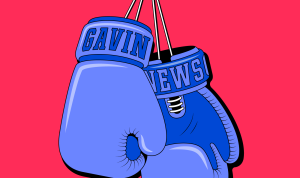Tina Johnson never had much. She grew up in the sixties, outside of Gadsden, a hilly city in the green mountains of upper Alabama. Johnson’s mother, Katherine, couldn’t read or write, but she knew how to make money. She would leave the house with ten dollars and come back with a hundred, because she had bought a gallon of paint and painted someone’s house. She worked as an electrician—it was a mystery how she’d got her license—and drove diesel trucks. Sometimes she would go to a local warehouse and collect a truckload of potatoes that had been nicked and wouldn’t sell. She’d store them in the basement with lime on them, and the family would eat potatoes for months. “I don’t want to say it like this, baby, but I’m gonna say it—we were like the Black folks,” Johnson told me recently. “We didn’t have the opportunities that white folks had.”
Johnson was a beautiful girl, with blond hair and radiant blue-green eyes that didn’t seem God-given. And she was scrappy. She helped her mother take care of their hog, cows, and goats. The family grew crops on land they leased: one year they planted green peppers, another year sugarcane. They didn’t have farm equipment, so they cut down the cane themselves, stripped it, and took it to the mill to be turned into syrup, then used the money to go on vacation to Disney World and Yellowstone. Johnson and her siblings didn’t play sports or do extracurricular activities like other kids, so they created their own fun. They went to the lake and made mud pies, climbed trees to gather fruit, and busted open the watermelons that their neighbors grew, to eat the flesh. “We thought that if you ate it in the field, it wasn’t stealing,” Johnson said. (To this day, it’s hard for her to eat watermelon, because she ate so much back then.)
She was used to various men moving in and out of their home. Katherine had run off with a d.j. when she was just twelve years old, the first of five men she would marry. She had three kids with him—Johnson’s older half siblings—before the couple split. Johnson was the result of an affair with a married man who owned a local tractor company. He paid for Katherine’s prenatal care, and when Johnson first came home from the hospital she was dressed in brand-new clothes. But she didn’t know that he existed until she was twelve. The man she considered her dad was named Griffin. His family had lost everything during the Great Depression, and he hid money in milk jugs, couch cushions, and spare tires. “A lot of people call crazy people that’s got money ‘eccentric,’ ” Johnson said. “But if you ain’t got no money you’re crazy. Daddy had a touch of crazy.”
Johnson once found a stack of hundred-dollar bills, and started giving them away at school, until a teacher stopped her. Her mother yelled at her for being reckless, but Katherine herself kept Griffin’s money whenever she found it. And it was Katherine who taught Johnson how to get money out of him, through flattery and passive aggressiveness. “I didn’t like playing those games,” Johnson said. “But Mama knew how to use those men.” When her mother felt that a man was no longer bowing to her needs, she was through with him. That was how Johnson learned to be a woman: she was a pretty girl and had a gold mine between her legs, everyone told her. She should never give it up, but she could use the promise of it to get what she wanted.
When Johnson was about four, her uncle William, Katherine’s brother, started sexually abusing her. He would take her to his darkroom, put her on his lap, and rub between her legs. Johnson thought that this must be the way the photos were developed. It made her feel like dirt, and she ran whenever she saw him. This lasted for a few years. At about the same time, another uncle—Katherine’s brother-in-law Claude—started abusing her as well. He touched her at family gatherings while other children played in the same room. He threatened that if she told anybody about the abuse, he would beat her, and hurt her mother, too. She would later discover that William had also abused her sister Robin, and Claude had molested her niece Michelle.
Back then, sexual abuse wasn’t something that you discussed. “It’s drilled in from birth—you don’t talk about sex at all,” Johnson said. Women weren’t supposed to be powerless anymore, exactly; Katherine owned a rifle and showed her kids how to use a shotgun. But you were still supposed to submit to what a man wanted. And there was no such thing as being violated by a man with means: that was a form of flattery. Johnson could get an education and a job, but pleasing the men in her life would always be the ultimate way of proving her value.
The abuse from Claude stopped only because Johnson got mad. She was washing dishes in the kitchen one day when she was twelve, after a family gathering at her house. Everyone else was outside. As Johnson stood at the sink, her uncle came inside and put his hands on her vagina. She happened to be cleaning a cast-iron skillet, and before she knew what she was doing she hit him over the head with it. Seeing him bleeding, she grew terrified: she thought that her mother was going to beat her to death. “I was more scared about getting a whupping than realizing what I had done,” she said.
Johnson went outside with her head down, nearly shaking. Then her uncle told the group that he had accidentally hit his head. He looked scared. It was the first time she truly understood that what he had been doing to her was wrong. He never touched her again. But the rage stayed with her—over the abuse, and over how powerless she had felt. She just knew that she would never put up with that kind of behavior again.
Family cycles are hard to escape, and Johnson repeated her mother’s pattern. She got her first boyfriend, James, when she was thirteen and he was about seventeen. She agreed to sleep with him when she was sixteen, and got pregnant that first time. The couple married, but she soon filed for divorce. The relationship left her with a son, Daniel.
Johnson briefly married a medical student, but it ended when she had an affair with a carpenter named Earl, whom she later married. He was sweet, though after he got home from work he would drink in his truck, then pass out. That marriage lasted a decade. By then, the couple had two daughters, Ashley and Candelyn. In the past, Johnson had made a little money modelling for department stores. Now she got a job managing a convenience store.
In the years that followed, Johnson lost interest in dating. She was afraid that one of the men she brought home might touch her daughters. If she did have a man over, she made sure the girls were out of the house. It was only after she had young daughters of her own that Johnson realized the abuse she had experienced was not her fault. One day when they were four and five years old, she was watching them watch TV, and it came to her: she hadn’t invited the attention, as she once had feared. “It didn’t register till then,” she said. “I’m thinking, Oh, my God, how could you even think that?” She had heard some people minimize child abuse by saying that at least abusers didn’t kill the children. But they might as well have, Johnson thought, because it stopped them from becoming who they might have been. She used to act out in school, and she struggled with depression. She always felt as if she might fall prey to men looking for victims. “They could spot me a mile off,” she said. “All this had been built up for all these years. And it was a dam ready to bust.”
Then it did. Johnson’s mother had helped raise Daniel. He’d lived at her home on and off, and she doted on him, giving him new shoes and toys. In 1991, when Daniel was twelve, Katherine filed for custody. He wanted to go, so Johnson decided not to fight it.
Johnson and Katherine showed up at the office of a prominent lawyer to transfer custody. His name wasRoy Moore. Johnson could immediately tell what kind of man he was. It was more than the way he was eying her; it was his questions about the ages of her two small daughters and the color of their eyes—if theirs were as pretty as hers. He asked her to get a drink with him afterward, which she declined. Katherine liked that Moore was paying attention to Johnson: he had money and influence. Johnson just wanted to leave.
But when she made her way toward the door, she recalled, walking behind her mother, Moore grabbed her so far up the back of her thighs that she felt his fingers on her vagina. One minute she was simply moving through space, and the next minute a stranger’s hand was on her body. “I didn’t even turn around, I just kept going,” Johnson recalled. For a survivor of sexual violence, another assault “brings all that weight and that torture you went through right back, all raw.” She couldn’t remember much else from the meeting. The only thing that stood out was his hand on her body. “You never forget it,” she said.
For a long time, sexual violence was seen as a part of life—something women were told to avoid, and blamed for when they couldn’t. Police departments often did little to investigate claims. Accusers were humiliated in court. But when the#MeToomovement began, in the twenty-tens, something changed. Powerful men likeHarvey Weinsteinwere accused of serially assaulting women and then actually faced punishment. Women came forward with stories of harassment by prominent journalists and Silicon Valley founders, and the internet took up their cause. Men lost their jobs; some went to prison. “The awareness shifted,” Jennifer Mondino, the senior director of the Time’s Up Legal Defense Fund, told me. “For advocates who had been working on gender-based violence and gender-justice issues, that was very exciting.”
At the height of this moment, in 2017, Johnson was surprised to see Roy Moore’s face on her TV. Moore had become the chief justice of Alabama’s Supreme Court and then been dismissed from the position after refusing to take down a five-thousand-pound monument of the Ten Commandments that he had had erected in the judicial building. He was now the Republican nominee for an open seat in the U.S. Senate. He appeared in public wearing a cowboy hat and riding a horse named Sassy. He was leading easily in the polls. But Leigh Corfman, a fifty-three-year-old woman who worked at a payday-loan center, had just accused him of sexual misconduct.
Corfman said that Moore had initiated a sexual encounter with her in 1979, when she was fourteen and he was thirty-two. He had approached her outside a courtroom, where she was sitting with her mother, and then taken down her phone number after her mother stepped inside. He later brought her to his home twice, where they were physically intimate. The situation felt both exciting and terrifying to Corfman. Only later did she understand that it had been inappropriate. “I got mad about it again as a grown-ass woman,” Corfman told me. “I realized really what had happened and put it in the proper framework of what it was.”
Corfman didn’t want Moore to be her senator. “I wanted people to know what he had done to me, because it was life-changing,” she said. “He caused great harm to me.” She agreed to speak to a reporter at the WashingtonPost. “I called both my children and told them that I had been approached by a writer from theWaPo—and they were, like, ‘What’s that?’ ” she said, laughing. When Moore had run for chief justice, she had considered saying something, but her children had been young, and they were afraid of being ostracized at school. Now they were adults, and encouraged her to speak out.
After hearing Corfman’s story, Johnson also felt compelled to do something. “At first I tried to ignore it,” she recalled. But locals “were getting on national television and saying this girl deserved it, that she shouldn’t have been there. That we were marrying people at fourteen back then. They were, like, ‘Oh, she’s lying.’ Then they started trying to put Roy Moore and her up to Virgin Mary and Jesus Christ! Saying that Mary was a teen-ager when she got impregnated with Jesus. And I’m thinking, These people are willingly ignorant.” She decided she had to support Corfman: “I just wanted someone to know that she wasn’t lying.”
She e-mailed a reporter at the news site AL.com who had written about Corfman’s accusation, and related her own experience. “Once AL.com posted, it just went wild,” Johnson recalled. The press staked out her lawn. Johnson flew to New York to appear on Megyn Kelly’s show. (She refused to do “The View.” “It wasn’t a good platform, ’cause they like to argue too much,” she told me.)
Soon, other women came forward. Beverly Young Nelson accused Moore of sexually assaulting her when she was a sixteen-year-old waitress and he was the deputy district attorney of Etowah County. After offering to drive her home from the restaurant one night, Nelson said, Moore parked his car next to a dumpster and began groping her; when she attempted to escape, he locked her door and tried to force her to perform oral sex on him. “I was terrified. . . . I thought he was going to rape me,” Nelson said at a press conference. Gena Richardson was working at a mall in Gadsden around her eighteenth birthday when, she said, Moore invited her to a movie; he then forced her to kiss him in his car in a way that “scared” her. (Moore was reportedly banned from the mall around that time for bothering young girls.) Becky Gray said that she endured multiple unwanted advances from Moore when she was twenty-two and working at the mall. Gloria Thacker Deason said that she had dated Moore, who was thirty-two, when she was eighteen. According to Debbie Wesson Gibson, Moore asked her out after speaking at her high-school civics class, when she was seventeen and he was thirty-four; they went on a few dates and kissed. Wendy Miller said that she was sixteen when Moore first asked her out, but her mother wouldn’t allow her to go.
Moore declined to comment for this piece, due to pending litigation. But he has denied Corfman’s allegations. “I don’t know Ms. Corfman from anybody. I never talked to her, never had any contact with her. The allegations of sexual misconduct with her are completely false,” Moore said on Sean Hannity’s radio show. “I believe they’re politically motivated.” He has also denied the other women’s stories, including Johnson’s. “I did not date underaged women,” he told a podcast called the Voice of Alabama Politics. “I did not molest anyone. And so these allegations are false.”
Watching the broader #MeToo movement, the women came to feel that they were part of a greater force for justice. “I was scared to damn death when we started this thing,” Corfman told me. “But, as it went on, I gained conviction in what I was doing.” Johnson received encouraging messages from around the world. Corfman was named inTime’s“Person of the Year” issue. The women became friendly, exchanging calls and once going out for dinner. Moore still looked invincible in the polls. No Democrat had won a Senate seat in Alabama in twenty-five years. But, when the election came around, he lost. It seemed as if some kind of justice had prevailed.
The first time Johnson and I met was at her house in a pleasant, mountainside neighborhood in Gadsden. Now in her sixties, Johnson is still beautiful, with frosted blond hair. She and I had spoken briefly on the phone. But when she opened the door she seemed stiff and nervous. As I followed her into the kitchen for a glass of water, I wondered if she was surprised that I was Black; all she knew about me at that point was that I worked atThe New Yorker. In Alabama, my home state, people from different racial groups don’t often spend time in one another’s houses unless they are well acquainted. We sat down on her couch, and I tried to get her to relax by asking about her current husband, Morris. She showed me some photos. Johnson’s husband was Black; so were her stepchildren. She was ill at ease, I realized, because I was a stranger in her house. Her husband is stingy, she told me apologetically, and makes her reuse their red plastic cups and Styrofoam plates.
After Moore lost the election, resentment over the results grew. In 2018, the same day that Moore’s Democratic opponent, Doug Jones, was being sworn in to office, Johnson’s house in Gadsden burned down. The night before the fire, her neighbor’s dog was going crazy. Johnson got up three times to turn on the floodlights and see if someone was out on the lawn. “There was something out there,” she said. She was not supposed to report to work the next morning, but she went in at the last minute. At about 9A.M., she got a phone call saying that her home was aflame.
Johnson and Morris moved into a motel room while they looked for a place. They had lost everything. Potential landlords were wary once they found out who Johnson was, but the couple eventually found a house owned by a man who said he couldn’t stand Moore. A female tech executive in San Francisco started a GoFundMe campaign for Johnson, and they rented the new place with the donations. But they were still paying down the mortgage on the burned house, and had more than twenty thousand dollars in credit-card debt. “I was numb,” Johnson said. “For weeks, I didn’t eat.” The county sheriff’s office detained a suspect on the day of the fire, but he was later released. An arson task force announced that the incident had nothing to do with Moore, upsetting Johnson. It then said that the investigation into the cause was inconclusive. The blaze could have been purposely started using ignitable liquids that were found in the debris, but the task force couldn’t rule out the possibility that it was started by a heater in the laundry room.
Johnson no longer felt comfortable being out in public. Once, when she was getting her car serviced, she overheard a group of people in the auto-shop waiting room saying that the women accusing Moore had been lying. “And I’m sitting right there! And they don’t even know who I am,” Johnson said. “I was, like, ‘Oh, Lord Jesus, have mercy.’ ” She got up and walked outside.
She didn’t feel welcome at church, either. Normally, when congregants went up to the altar at church to pray, the elders joined and put their hands on them. They no longer did this for Johnson. People seemed cold. Eventually, she and Morris stopped going. “I miss it, but it wasn’t the same,” she said. “People didn’t hug me that hugged me before. It’s like a wall’s built up. It ain’t my imagination, neither.” Johnson wasn’t especially religious, but going to church had given her a sense of belonging. “The Lord meant for me not to be there,” she said. “That’s the way I look at it.”
Moore’s other accusers faced similar treatment. Nelson, the former waitress, had produced a note that Moore left in her high-school yearbook, signed “Love, Roy Moore DA,” as evidence of their entanglement. But she eventually admitted that she had written the date and location under the note at a later time, to better remember the relationship. People started saying that she had made up the whole story, and her young children received threatening notes. “I’m scared to go anywhere,” she said at the time. “Shopping, I have to take someone with me.” A man yelled in Corfman’s face at a restaurant before being told to leave. She received death threats, and threats of sexual violence, so she began carrying a pistol. “I’m a big girl, so I wear big clothes that are flowing,” she told me. “You couldn’t tell I had a .38 shoved down the back of my britches.” She no longer felt safe being in crowds, and found herself scanning rooms for the exits.
In May, 2019, on her birthday, Corfman had lunch with her daughter. Afterward, she drove home in her thirty-year-old Corvette with the top down. On the road in front of her house, she said, a pickup truck swerved into her lane and started racing toward her. She would never be certain of the driver’s motivations, but she believed that she was being targeted. “I had the option of either running underneath the truck and being decapitated or going to the other side of the road,” she said. Instead, she swerved to the right, trying to reach a roadside trail. But her car caught on a rock and flipped, and she landed upside down in a ravine.
She hung there by her seat belt for four hours, in and out of consciousness, before some neighbors found her. She had broken her neck and back, gotten a black eye and contusions on her head, and her cheekbones were fractured. But when the police filed the accident report, she told me, the officers said that they didn’t believe another driver had run her off the road. (The police department toldThe New Yorker, “There was no evidence indicating any other vehicles were involved.”) The officers, she said, suggested that she might have crashed because she was under the influence of alcohol. (She had had a few beers at lunch.) She recovered at her mother’s house for more than five months. “When they found me, they thought I was dead, and I was really close,” she recalled.
Moore had been publicly attacking Corfman. “He called me everything in the thesaurus that’s under ‘liar,’ ” she said. In 2018, she filed a defamation lawsuit to make him stop. “What I wanted was an apology, recognition in a public way that he did what I said he did,” she explained. Moore retaliated with his own defamation suit against her. Then he sued three of the other women, including Johnson, demanding damages. Journalists began calling Johnson’s house at all hours. She and two of her grandkids went to Florida, where her sister lived, to escape for a while. The next year, Moore announced that he was again running for the Senate. He ultimately lost, but Johnson couldn’t believe that his comeback had even seemed possible.
The backlash had begun. The #MeToo movement had created a sense of immense possibility for survivors of sexual violence. But, in time, that sense seemed to fade. Accusers, let down by the justice system, had turned to anonymous Instagram accounts, Excel spreadsheets, and Twitter threads. But these extrajudicial processes failed to offer due process to the accused. Al Franken was forced to resign from the Senate after accusations of sexual misconduct, and he apologized, but many of his colleagues later expressed regret that his case had not been independently investigated. The author Junot Díaz was culturally blacklisted over accusations that he had behaved inappropriately toward female writers, but a review commissioned by the Pulitzer Prize Board found no evidence of wrongdoing. The comedian Aziz Ansari was censured and mocked after an article came out depicting him pressuring a woman to have sex with him on a date. (Ansari said in a statement that he thought the interaction had been “completely consensual.”) A general fatigue with “cancellation” took hold, and conservative media outlets and politicians weaponized this weariness against the movement. The podcaster Joe Rogan recently said that he was “on Harvey Weinstein’s side”: “He would make deals with ladies, like ‘Suck my dick and I’ll get you an Oscar.’ . . . If this had happened in the eighties, they probably would have thrown it out. But in the #MeToo movement, it was a hot witch hunt.”
Men found ways of pushing back against their accusers. In 2018, the actress Amber Heard wrote an op-ed saying that she was a survivor of abuse. Her ex-husband, Johnny Depp, denied abusing her, and filed a defamation suit. The trial, which was live-streamed, became a media circus. Right-wing outlets framed Heard’s allegations as part of a larger assault on men. Memes circulated on social media, amplified by bots, mocking Heard for crying in court and calling her crazy. #JusticeForJohnnyDepp trended globally on social media. (One post read, “Who wants to join me in my expedition to brutally murder Amber Heard.”) So did #AmberHeardIsALiar and #AmberHeardIsAPsycho. Her personal information, and that of her family and friends, was leaked on online forums. In the end, the court determined that Heard and Depp had defamed each other, but Heard was ordered to pay a larger amount. “I defended my truth and in doing so my life as I knew it was destroyed,” she wrote on Instagram. The musician Marilyn Manson sued the actress Evan Rachel Wood, his ex-fiancée, for defamation after she accused him of drugging and raping her during a music-video shoot. He denied wrongdoing and claimed that she was seeking attention and trying to smear him. She soon became the target of online harassment. Manson eventually dropped the suit and agreed to pay Wood’s legal fees. But Wood told a podcast, “To have to go back there over and over again, to be publicly gaslit on a large scale or even a small scale, it’s very, very re-traumatizing.”
Jessica Ramey Stender, the policy director at the nonprofit Equal Rights Advocates, told me, “We were seeing this disturbing pattern emerge: as more survivors came forward, the perpetrators who harmed them were using retaliatory defamation lawsuits to threaten them.” The plaintiffs in such suits didn’t have to win for the efforts to be successful. Powerful men often have more resources to wage legal battles than their accusers. And the suits allowed them to cloud public opinion about even the most verifiable claims. “These retaliatory lawsuits were designed to drain survivors of financial resources, re-traumatize them through lengthy proceedings, and really intimidate them into silence,” Stender said. Some men had the means to hire private investigators to find incriminating information on survivors, to deploy media campaigns designed by public-relations firms, and to mobilize their online followers. In the nineties, Jennifer Freyd, an expert on the psychology of sexual violence, developed a model calledDARVOto explain the ways perpetrators deflect blame: “Deny, attack, reverse victim and offender.” “It’s an aggressive denial, usually attacking a person’s credibility,” she told me. “Trump is really good at it.”
Such campaigns can have a chilling effect. Stender has worked with college students and corporate employees who have filed complaints against abusers. Several faced retaliatory lawsuits, couldn’t pay for lawyers, and withdrew their claims. Stender put me in touch with Jess Miers, who, while attending law school at Santa Clara University, filed a sexual-assault complaint against another student. (He denied the allegation.) He sued her, even though she had dropped the complaint by then, and she had to hire lawyers. (The suit was eventually dismissed.) “Once litigation has been brought, for folks who are supporting you, are advocating for you, it becomes a lot more real for them,” Miers, now a law professor at the University of Akron, said. “They take a step back.”
Today,Donald Trump, who has been accused of sexual misconduct by roughly two dozen women and found liable for sexual abuse in one instance, is once again President. The former New York governorAndrew Cuomo, who, according to a Department of Justice investigation, sexually harassed thirteen women, is running for mayor of New York City, and seems likely to win. (Both men have denied wrongdoing in all cases.) Many women have been left feeling betrayed by a public that encouraged them to share their stories. The actress Chloe Dykstra accused the comedian Chris Hardwick of emotional and sexual abuse, and initially enjoyed public support. (He denied the allegations.) “Then the tide kind of shifted,” she said. “I was attacked relentlessly.”Christine Blasey Ford, the Stanford psychology professor who accused the Supreme Court nominee Brett Kavanaugh of sexual assault, has faced harassment and death threats, and has at times had to move her family into a hotel for security. (Kavanaugh, who was later confirmed, denied wrongdoing.) In an interview last year, she said, “If I had known, I don’t think I would have jumped off the diving board.”
In 2017, Pamela Lopez, a lobbyist in California, said that the Democratic assemblyman Matt Dababneh had pushed her into a bathroom, masturbated in front of her, and demanded that she touch him. “It was terrifying,” she told me. “I was afraid that he might try to rape me.” Dababneh denied that the incident had happened, but was forced to resign. The following year, he sued Lopez for defamation and emotional distress. “I want my reputation back,” he said. Lopez had just had a baby, and the emotional toll of the lawsuit was intense. “All sorts of crazy rumors” about her sex life circulated through the state capitol, she said. “His strategy was to discredit and destroy me.” She had panic attacks. A court finally ruled in her favor in late 2021, but the damage was lasting. “It was a terrible, very public, and very humiliating experience,” she said. “I had to bravely stand up for myself.”
In 2021, a lawyer named Elyse Dorsey accused a law professor at George Mason University, Joshua Wright, of initiating a sexual relationship with her while she was a student. Wright resigned two years later, after a university investigation found that he had slept with five students and made advances to two others. He then filed a defamation suit against Dorsey and another former student, seeking more than a hundred million dollars in damages. She had to take several months’ leave from work, and went to a residential program for trauma recovery. In the end, she settled with Wright to avoid accumulating even more legal expenses, paying him three hundred thousand dollars, which was covered by insurance. (Wright said in a statement, “The evidence has made it undeniably clear that the relationships in question were consensual from the start.”) “It felt really gross,” Dorsey said. “To watch the justice system be perverted and weaponized against me like this was so disheartening.”
The second time that I visited Johnson, we talked in her back yard. “Baby,” she would begin a sentence. “You just don’t know,” she would end it. She had been gardening and spending time with a new grandchild. But she was unnerved by the growing resentment toward #MeToo. She thought that Trump was unfit for office. But even her husband liked some of the things the President had done. She had never voted in a Presidential election; she had never felt that it would make a difference. She was beginning to feel differently now.
“I’m fine,” she told me, sighing. She wasn’t fine. She felt that people in town were giving her hard looks. “I had real bad anxiety, nightmares, and always looking over my shoulders,” she said. “It’s just too much.” Once, when she was grocery shopping with one of her daughters, a woman came up to them. Johnson’s daughter was sure that the woman was going to say something rude. But the woman thanked Johnson. She said that she believed her and thought she was brave for coming forward.
Leigh Corfman told me that she had become a “hermit” in the years since making her accusations. “What I’m doing right now is rebuilding me,” she said. “It changed my life. It changed my physicality.” She had severe back pain, rheumatoid arthritis, osteoarthritis, and fibromyalgia, and was convinced that the stress surrounding the events had contributed to her ailments. Since her car accident, she was unable to stand long enough even to wash the dishes. She couldn’t work and was living on food stamps. Corfman felt disappointed. “I would have thought there would be follow-up at some point,” she said. “It’s like, once the men started complaining andMAGAgot involved, we can’t talk about this anymore. This has to be swept under the rug.”
Corfman’s legal proceedings took about four years. Once, while on the stand, she pointed to Moore and said that he knew what had happened; he mouthed back to her, “You fucking bitch.” His lawyer described her as a “whore” and a “liar,” and argued that putting your hand in someone’s bra, as she said Moore had done to her when she was fourteen, wasn’t a big deal. In the end, the judge found that no defamation occurred on either side in the case. She was disappointed that Moore wasn’t held accountable. “It was a letdown,” she said. “I think I was very naïve.” Some of Moore’s legal efforts have been more successful. In 2018, he sued a Democratic-alignedPACfor running an ad describing some of his alleged misbehavior, and a jury ruled in his favor, awarding him eight million dollars. (The case is currently being appealed.)
Moore’s suit against Johnson and two other accusers is ongoing. She has hired a lawyer, but has no idea how she is going to pay him. She feels abandoned. “The women that come out—once you come out, it’s all great, but then it’s, like, Who cares?” she said. “I still need you! I need the support. Don’t leave me now!”
Johnson regretted making her story public in the first place. “I have been through hell, you hear me?” she said. “There’s no way in hell I’d go through this again. People shun me like I’m the plague. It’s very hurtful.” But, when I asked her if she ever thought of leaving Alabama, she didn’t stop to think: “My mother instilled in us that you can push me home, but that’s as far as you can push me.” She wasn’t going to be forced out of her town. “You fight,” she said. ♦
This is drawn from “Blessings and Disasters: A Story of Alabama.”










